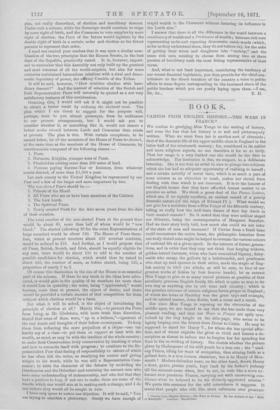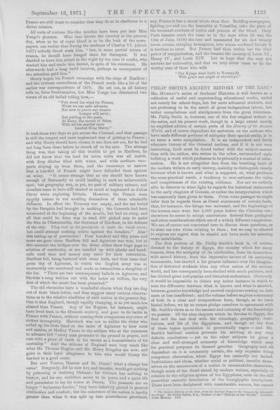BOOKS.
CAMEOS FROM ENGLISH HLS'TORY.—THE WARS IN FRANCE.*
Ws; confess to grudging Miss Yonge to the writing of history, and none the lees that her history is so well amid picturesquely written. What we want from her is another sort of chronicle ; that of the domestic life of the upper middle-class in England in the latter half of the nineteenth century ; for, considered in its nobler and more religious aspects, no one describes it for us so truly. That her range is a very- limited one she would be the first to acknowledge. The limitation is due, we suspect, to .a deliberate intention. She is too true an artist to care to plunge into subjects which she has had no adequate opportunity of realizing to herself ; and a certain severity of moral taste, which is as much a part of some natures as an objection to musk, makes her shrink from dealing with that which is not innocent. It is to the honour of our English homes that they have afforded honest matter to so genuine an artist. We think .a great deal of the Paston Letters, which are, if we rightly recollect, an earliest record of a purely domestic nature (of the reign of Edward IV.). What would we not give for a novelette from a Miss Yonge of the fifteenth eentnry, telling us really how the well-born dames of that day dwelt in their moated manors ? Be it noted that they were neither stupid nor illiterate, being the contemporaries of Margaret Beaufort. Had we their story truly told, how much else could we not infer of the state of men and manners ? If Cuvier from a fossil bone could reconstruct the entire beast, the philosophic historian from one truly-tinted zone might be helped to recreate the various colours of national life at a given epoch. In the interest of future genera- tions, and in order that they may not think that forging widows, golden-haired, baronets, wives who have committed bigamy, dairy- maids who escape the gallows by a hairsbreadth, and gentlemen who shut up mad spouses in their attics, made the staple of liug- lish society in 1850 (we allude, as will be seen, to four of our greatest works of fiction by four famous hands), let us entreat Miss Yonge to give us as many varied pictures as possible of that peculiarly gracious English family life which is quite as true in its own way as anything else in our time and country ; which is the genuine outcome of certain religious forces proper to England; of which the home at Hurstley was the groat type and example, and its sainted master, John Keble, both a cause and a result.
But since Miss Yonge is reposing on the chronicles of the middle ages, we are bound to say that she has made them very pleasant reading, and that her Wars in France are aptly spa- bellied by time tiny knight on the title-page, who seems to be lightly leaping over the c1.6 trait from Dover to Calais. He may be supposed to stand for Henry V., for whom she has special affec- tion, and of whose exploits she gives so vivid and human a de- scription as almost to induce one to forgive her for spending her time in the re-writing of history. She doubts whether the picture given by Shakespeare of his wild youth be a true one ; the "mad- cap Prince, idling for want of occupation, then shining forth as a gallant hero, is a true human character, but is he Henry of Mon- mouth ? Modern defenders have, on the other hand, drawn Henry a stern, grave, precise youth, kept back by his father's jealousy till the moment came when, free to act, he rode like a stern re- formner over prostrate France, carrying out with unswerving con- fidence what he believed to be his divinely-appointed mission," We quote this sentence for the odd coincidence it suggests. It Booms that people who ride like stern reformers over prostrate CIVII4A4frOrii English llielory.—The Wars in France. liy the Author of the " Htlir of Rodolyfio." London: bthemillan.
Franco are still wont to collider that they do so in obedience to a divine mission.
All sorts of curious life-like touches have been put into Miss Yonge's pictures. Who that knows the country at the present day, when to be of royal blood is to be the butt of the news- papers, can realize that during the madness of Charles VI. (about 1407) nobody dared wash him, "lost, in some partial return of reason, he should have hanged them for disrespect. It was decided to have him seized in the night by ten men in masks, who washed him and made him decent, in spite of his resistance. He afterwards had a long lucid interval, perhaps in consequence of tit° attention paid him."
Henry began his French campaign with the siege of Hardens ;
and the extreme unreadiness of the French reads like a bit of the earlier war correspondence of 1870. He set out, as all history tells us, from Southampton, but Miss Yonge has disinterred two verses of an old ballad telling how,—
"Fair stood the wind for Franco, When we our sails advance,
Nor now to prove our chance Longer will tarry; But putting to the main'
At Kaux, the mouth of Seine, With all his znartial train Landed King Harry."
It took them two days to get across the Channel, and that passage
is still the longest and most unpleasant way of getting to France ; and why Henry should have chosen it one does not see, for he had not long been there before he struck off to the east. The strange thing was, that taking all this trouble to get to Harfleur, he did not know that the land for seven miles was all marsh, with deep ditches filled with water, and wide earthern ram- parts sloping up from them, and the causeways so narrow that a handful of French might have defended them against an army. "It seems strange that no one should have known enough of Normandy to avoid lauding in such an unfavourable spot ; but geography was, as yet, no part of military science, and invaders seem to have still steered as much at haphazard as Julius Cassar when exploring Britain. However, the French were equally insane in not availing themselves of these admirable defences. In effect the Treasury was empty, and the tax levied by the Dauphin had brought in nothing ; the Generals had been nominated at the beginning of the mouth, but had no army, and all that could be done was to send 400 picked men to assist the Sire de l'Estonteville, the Governor of Harfieur, in his defence
of the city. They took up the pavements to make the roads worse, but could attempt nothing active against the invaders." Alas this taking-up of pavements I Four hundred and fifty years and more are gone- since Harileur fell and Agincour was won, but at this moment the bridged over the Seine either show huge gaps in solution of continuity, or arc mended up with planks and hand-
rails until time and money may servo for their restoration. Harflour fell, being battered with stone balls, and then Caine that groat day of Agincour, in which the English army was so enormously out-numbered and made so tremendous a slaughter of the foe. "There are two contemporary ballads on Agincour, and likewise a song written out with the notes ou vellum, the very first of which the music has boon preserved."
The old chronicles have a wonderful charm when they are dug out of their black-letter, and they suggest many curious observa- tions as to the relative c'onditiou of each nation at the present day. One is that Eligland, though rapidly changing, is as yet much less altered than France. Any of the Napless, for instance, might have lived back in the fifteenth century, and gone to do battle in France with France, without causing their companions any sense of violent incongruity. Havelock was not so unlike the victor who called up his little band on the morn of Agincour to hoar mass and matins, or liedley Vicars to the soldiers who at the summons to advance fell "every man prostrate to the ground iu prayer, and rose with a piece of earth in his mouth as a remembrance of his mortality." And the citizens of England were very much like what Mr. Thomas Hughes and Mr. Henry Kingsley are now, and gave in their loyal allegiance to him who would thump the hardest in a good cause.
But over France, Heaven and St. Denis what a change has come! Burgundy, did he now live and breathe, would get nothing by poisoning or stabbing Orleans ; for Orleans has nothing to bestow, and his one ambition seems to be peace and a quiet life and permission to lay his bones at Dreux. The peasants are no longer " barbarous hordes," they have infinitely gained in present civilization and comfort ; but the coherence of the nation is hardly greater than when it was split up into quarrelsome provinces,
nay, France is less a moral whole than then. Scolding newspapers, fighting pro and con the Assembly at Versailles, take the place of the incessant combats of nobles rind princes of the blood, Only Paris remains much the same as in the days when (it was the 12th of .Tune, 1419) she rose and massacred for six and twenty hours certain usurping Armagnaes, into whose confused history it is bootless to enter. But France had then within her the vital power of reorganization, and she became the country of Louis XL , Henry IV., and Louis XIV. Let us hope that she may yet retrieve her nationality, and that we may never cease to be the worthy sons of those who with
"Our Kyngo wont forth to Normandy With grace and might of ohyvalryo."































 Previous page
Previous page